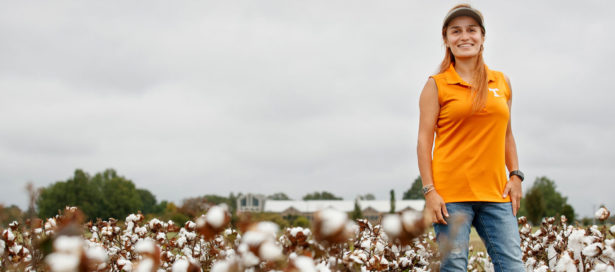By Gary Hengstler | Photo by Nathan Morgan
If scientific prognostications are correct, farmers in West Tennessee soon will struggle with increasing dual threats—drought and flooding.
And, if those future problems are to be dealt with successfully, it will be, in part, because of a country-music-loving woman from Sanandaj, Iran, who works at the University of Tennessee Research and Education Center in Jackson.
When Avat Shekoofa fell in love with plant physiology as an undergraduate, it set her on a career path leading to a doctorate at Shiraz University in Iran.
“I didn’t want to put this book down,” she says of her plant physiology course. “That was the start; this is what I want to do.”
Her research took her to Argentina and then to the United States, to join the team of Thomas Sinclair, a plant physiology specialist at North Carolina State University.
“Given her goal of doing relevant research,” Sinclair says, “I was fairly sure I would be losing Avat to Tennessee when I first saw the job announcement for the position at Jackson.”
She now works as an assistant professor specializing in crop physiology-water stress and irrigation in the department of plant sciences for the UT Institute of Agriculture.
After earning an undergraduate degree, Shekoofa worked as Iran’s equivalent to a county extension agent, trying to help farmers by developing winter wheat that is more resistant to freezing.
“I was the only female working with five guys,” she says, “and every single time I suggested an idea, they would say, ‘This is not going to work,’ or ‘We will go talk to the farmers because they won’t listen to you,’ or ‘You don’t need to get out of the car because it’s muddy.’”
Although, like most women, she had to put up with the Iranian versions of “darling” or “honey,” she said the real irritations happened when she wanted to contribute and was blocked, though she knew her scientific knowledge equaled that of her coworkers. “I have to speak for what I know,” she says.
In Tennessee, her work is 75 percent research and 25 percent extension fieldwork. “When I have gone out, the agents and producers have been very respectful, and I have enjoyed my discussions with them.”
At first blush, and with a generally skeptical perspective toward Iran across America, one might think her discussions with Tennessee farmers could be awkward. But Shekoofa can find common ground on at least one fail-safe topic—country music. From Johnny Cash to the Zac Brown Band, she is a fan.
The one drawback to life in Jackson is her separation from her family after Iran was added to the U.S. immigration ban list in early 2017. Given changing regulations and court rulings, her family can no longer visit her as they once did. Whether regulations would permit her to visit family in Iran and return to work at UT is unclear. While a lawyer advised Shekoofa that she could travel to Iran to see family, uncertainties about visa regulations remain. For now, regular Skype and FaceTime conversations keep her in touch with her family that includes parents, three sisters and two brothers, all of whom have advanced degrees.
“Maybe I was lucky,” she says. “I had the best experience in the U.S. Embassy in Dubai, where they were very nice and polite, and we talked all about science. I told the embassy assistant I spent time in Argentina, but if I really want to do research on corn, I need to go to America. I got my visa in 14 days.”
During four years at North Carolina State, she made discoveries that contributed to increasing the drought tolerance of crops. “Her passion to investigate how crop plants ‘work’ is balanced with her personal commitment to do research that is directly relevant to farmers,” Sinclair says.
Her landing in Jackson is a tale of persistence.
At NC State, she was considering offers from industry when a friend sent her a link to the UT job posting.
When she read job description, she immediately applied. “I said, ‘This is what I want.’ Tennessee took a long time to respond, so I just kept emailing them, asking them for an interview. Now I really, really like the people I work with, and the best part is I am still learning.”
Her work focuses on helping West Tennessee deal with alternating droughts and heavy flooding.
“We need scientists to think 10 to 20 years ahead of the situation,” she says. “There is a problem on the horizon because people here have always had sufficient rainfall, and it is taken for granted.”
Pulling out a color-coded map of future areas facing dire water problems, titled “Water Stress Threatens Ecosystems Productivity,” Shekoofa stresses that West Tennessee is in the region most at risk for floods and drought. Research during the summer of 2017 measured plant temperatures to better understand how much water plants need. With her plant physiology specialty, Shekoofa sees her job as researching water sources that will let farmers maintain and increase their crops.
“She has a passion for science and crop physiology and is incredibly driven,” says UT plant sciences department head Scott Senseman. “She has moved very quickly in just one year, and I believe that, in just a few short years, her work will be recognized as transformational in the area of crop water relations and drought.”
For Shekoofa, her current job shifted plans to return to her home country. “I was considering going to go back to Iran, especially in light of the travel bans,” she says. “When I was hired in 2016, I was so happy and excited. I am in love with what I’m doing, so I want to stay.”

